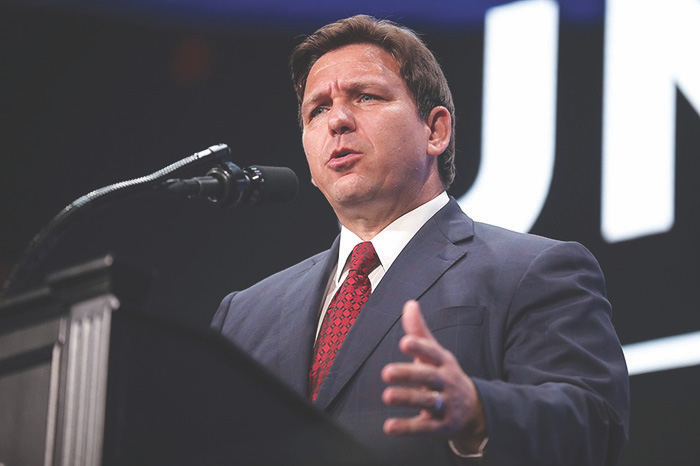Federal legalization is favored by the bipartisan majority, but that doesn’t stop some politicians from pushing reefer madness
Support for legal weed in the United States can now be said to be overwhelming. Just 10% of Americans oppose all forms of legalization, and the vast majority approves legalizing cannabis for adult use, according to Pew Research.
So why do so many Republican politicians—along with some Democrats—not only oppose legalization, but oppose it vehemently, as Florida Gov. Ron DeSantis indicated he did last week? After all, cannabis reform is among the tiny handful of issues that can be called bipartisan, and even MAGA lunatics like DeSantis’ Florida neighbor, Rep. Matt Gaetz, favor it. Meanwhile, according to Pew, 84% of Republicans favor legalization of at least medical pot, though only 45% approve of full legalization, compared to 73% of Democrats.
One explanation for why people like presidential candidate DeSantis and Senate Minority Leader Mitch McConnell remain opposed is that “support” doesn’t indicate how much a person might care about a given issue. For example, there is overwhelming support for rational gun-control policies, but that doesn’t move Republicans off their zealously radical gun stances. And it’s not just—or even primarily—the power of the gun lobby: politicians are mainly concerned with voters, and the voters they care most about are those who might be swayed by a politician’s stance on guns. Gun nuts might be in the minority, but if you lose enough of them, you lose the election, especially when voters who favor saner policies don’t actually vote based on that stance.
The same kind of thing is likely dictating certain politicians’ positions on weed. DeSantis’ declamations last week were particularly nutty and counterfactual. He went so far as to say that, as president, he wouldn’t even decriminalize pot, much less legalize it.
“I think that we have too many people using drugs in this country right now,” he said during a campaign event in South Carolina. “I think it hurts our workforce readiness. I think it hurts people’s ability to prosper in life.” Even more ludicrously, he declared that the pot “they’re putting on the street” might be contaminated, perhaps with drugs like fentanyl. There are two glaring problems with this: one, the idea that evildoers are lacing pot with fentanyl is a myth—why would anyone do that?—and two, one of the main arguments for legalization is that the product can be regulated and tested to ensure there are no contaminants in it.
DeSantis, of course, is trying to appeal to the base of the base, and a lot of those people are anti-weed. A lot of them are also old: according to Pew’s research, just 30% of people 75 and older, counting both parties, favor adult-use legalization. Also, research has shown that politicians of both major parties tend to overestimate the conservatism of their own constituents. We see Democrats do that when they rail against “cancel culture” or the “defund the police” movement that is mostly a myth. And conservatives do it even more with their own voters.
On top of that, some Republican politicians like to use weed as a wedge issue, to set themselves in opposition to Democrats. This works—to some degree, anyway—even when the targeted audience supports legal weed. Mitch McConnell has often used pot in this way, describing Democrats as flighty and unserious. And to some degree, though it’s not in fashion, some politicians might be campaigning based on their sincerely held belief that legalization is wrong.
In DeSantis’ case, it seems unlikely that he’s ever motivated by personal conviction. Note how he was a big advocate of Covid vaccines until he saw what anti-vax disinformation was doing to his constituents. And for now, he’s going after primary voters, who tend to be far more conservative than Republicans who ignore the primaries and vote only in the general election. According to a Pew report issued in November, about “four-in-ten conservative Republicans (37%) say marijuana should be legal for medical and recreational use, compared with a 60% majority of moderate and liberal Republicans.”
So if DeSantis wins the primary, expect him to moderate his positions at least slightly before November of next year.








